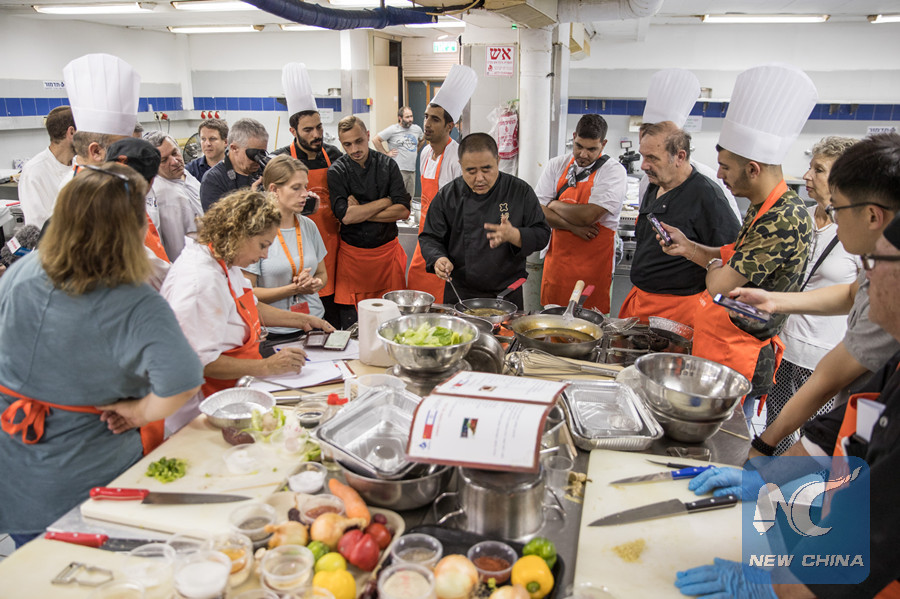
Israeli chefs learn to cook Chinese cuisine during a cooking class at Tadmor Hotelier School in Herzliya, Israel, on June 18, 2018. (Xinhua/Guo Yu)
JERUSALEM, July 6 (Xinhua) -- In a hot and steamy kitchen in the coastal Israeli city of Herzliya, a group of Israeli cooks huddled around Zhao Bin, a prominent Chinese chef, who explained in detail how to make a traditional Chinese dish: fried meatballs.
Following Zhao's instructions, each cook was required to make the dish on their own. Some made own subtle changes to the dish, while others chose to stick to the original recipe, enthusiastically waiting for the approval of Zhao.
The event, one of several masterclasses held in different cooking and hotel schools in Israel, was organized by the Israeli Tourism Ministry in an attempt to sustain the growing influx of Chinese tourists to the Jewish state.
Indeed, the past three years witnessed a sharp surge in the number of Chinese tourists visiting Israel, according to Israeli Tourism Ministry statistics. In 2017, a total of 113,600 Chinese tourists visited Israel.
In 2015, the number of Chinese tourists visiting Israel increased by 142 percent from the previous year, followed by 41 percent rise in 2016.
The potential for attracting more tourists from China, which is the top source of tourists, is so huge that the Israeli government is taking measures to cater to the specific needs of the Chinese tourists.
"Chinese tourists are different from the tourists we are accustomed to from Europe and the United States," said Efrat Meir-Groman, director of Vocational Training in Tourism at the Israeli Tourism Ministry.
"We noticed that when it comes to food, we have a disadvantage because the Israeli food is very different from what they are used to," Meir-Groman said.
A total of 400 Israeli chefs and cooks have participated in the cooking workshops that were conducted by renowned Chinese chefs like Zhao Bin.
In addition to teaching classes, the Chinese chefs have toured major attractions in the region, including the holy city of Jerusalem and the Dead Sea, a hot destination for tourists.
As the Israeli and Chinese kitchens are very different, so there is a lot to learn for the Israeli chefs.
"Israeli cooking techniques are relatively simple, while there are more than 100 kinds of cooking techniques for Chinese food," Zhao told Xinhua.
"The most important issue is how to let the Israeli chefs know more about China, especially the tastes of the Chinese," he said.
During the classes, the Israeli chefs were taught four different recipes with the hopes of having them integrated into local hotel and restaurant menus.
One of the biggest challenges in the Herzliya workshop turned out to be the different flavors and spices used by Israeli and Chinese chefs.
When Zhao was making the sauce for sweet and sour sesame chicken, he noticed that the Israeli tomato paste was not as red and concentrated as the Chinese one.
Eager to show his Israeli students how the authentic dish should look like, he sent one of them to get red food coloring. He quickly added some drops to the simmering wok and the color changed instantly.
"It is hard to cook with Chinese style in Israel if we cannot buy some flavoring ingredients in the country," Zhao said. "We will try to cook Chinese dishes with raw materials and local ingredients in Israel."
The Chinese chefs also had to adapt to the religious restrictions which characterize the Jewish kitchen. Kosher food has many requirements and limitations that do not exist in Chinese cooking, such as the prohibition of mixing meat and dairy products, or not eating seafood.
"The colors, the tastes, the way food is served ... everything is different and special," said Ofek Shabi Rubin, a 21-year-old cook from a hotel in Tel Aviv.
"In the Chinese kitchen, everything is crunchy, you can still taste the actual vegetable, not like in the Israeli kitchen where everything is mixed," said David Bril, a 64-year-old cook from a hotel in Netanya.
Next month, there will be a further increase in direct weekly flights between China and Israel, which could lead to a further rise in the number of Chinese tourists.
With the inauguration of three weekly flights between the Chinese city of Guangzhou and Tel Aviv in August, there will be a total of 10 weekly flights between the two countries.
Still, the Israeli Tourism Ministry is looking to increase the number of Chinese tourists to Israel.
Data from the ministry shows the average Chinese tourist spends double of an European tourist, making them a lucrative group for the Israeli market.
Romi Koral Pokoshevski, a 27-year-old cook who has been working at a hotel in Tel Aviv for 11 years, said she has witnessed the increase of Chinese tourists at the hotel in the past couple of years.
To cater to the Chinese guests, the hotel has changed its breakfast menu, as well as the buffet, which is now featuring many typical Chinese dishes daily.
The Israeli tourist industry is well aware of the fact that Chinese tourists stick very much to their own food, with little motivation to taste local dishes.
"They want their food. Their palate is more rigid in terms of opening up to new tastes. Israelis love Chinese food, but they (the Chinese) are very set on their food," Pokoshevski told Xinhua as she shook her wok with great expertise like a Chinese chef.
With an aim to attract more Chinese tourists, Israel intends to cater to their tastes, just to make them feel at home.
"Each region in China has a different population with different local tastes and cooking ways. We will also pay attention to this," Meir-Groman said.
He added that his ministry plans to have more Chinese cooking training sessions for Israeli chefs, in order to offer as many types of Chinese food as possible.

